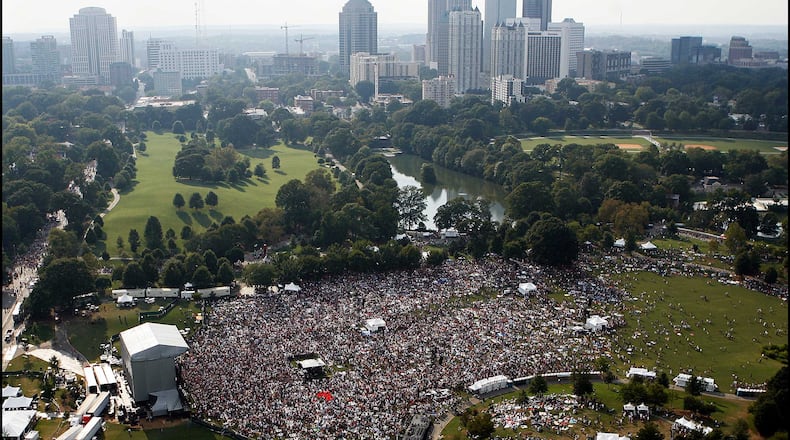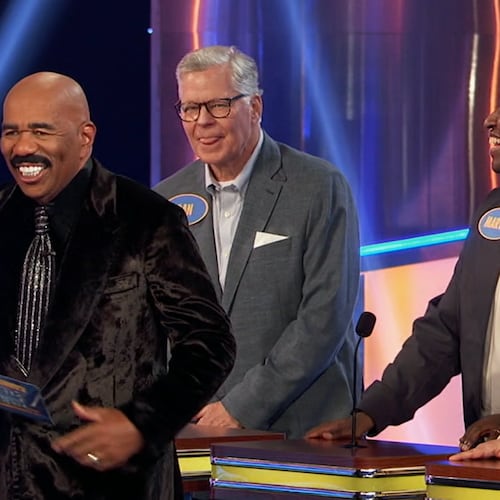Many years ago, a prominent music critic wrote about getting pegged in the head with a shoe at a concert.
The incident prompted an epiphany and he shared the story as his wake-up call of sorts to leave the business.
That anecdote always stuck with me partially because of the amusing visual, but also because I could relate to the ancillary frustrations that come with what is otherwise an undeniably awesome way to earn a living.
My beaned-by-shoe-at-show moment hasn’t arrived yet, but I am exiting The Atlanta Journal-Constitution stage for the opportunity to write about the national music scene for a national publication.
From my earliest days at the AJC when I was hired to cover attractions such as the Georgia Aquarium and Atlanta Zoo, to returning to my music-writing roots in 2012 and spending most nights and weekends in venues packed with people, sweat and eardrum-vibrating music at hundreds and hundreds of concerts, it’s been a grand, fulfilling experience.
Atlanta’s status as a music city was already cemented by the legacy of LaFace Records, the pioneering efforts of OutKast and the Dungeon Family and the evolution of Usher. But in my decade here, I’ve watched — and reported about — Atlanta’s escalation into not only a hip-hop mecca, but a musical epicenter recognized around the country.
Please don’t ever take for granted that this city is home to dozens of venues ranging from the intimate charm of Eddie’s Attic and Red Clay Music Foundry to the sleekly cavernous Mercedes-Benz Stadium to the historical majesty of the Fox Theatre to the new-car-smell backdrop of the Coca-Cola Roxy and, opening this fall, The Eastern. I also cannot forget to extol my favorite Atlanta venue, the Tabernacle, with its stained glass windows, multi-tiered balconies and cozy side rooms.
And that’s only about a quarter of the live music venues among your choosing.
I’ve lived in cities with one club, one theater and one dilapidated arena and I’ve traveled I-95 and I-64 countless bleary-eyed times just to catch that Pearl Jam concert at the closest amphitheater or to see Celine Dion in the nearest major market.
You’ve got it all right here, Atlanta.
And with the live music and touring industries reawakening, I beg you to support our venues, whether it’s the independents such as Smith’s Olde Bar and Center Stage or more sizeable city and county jewels State Farm and Gas South arenas. They all need bodies in seats.
Don’t forget the magnitude of our key festivals, either. Most cities offer one annual supreme, multi-act gathering — a Lollapalooza or Bonnaroo. Atlanta boasts Music Midtown. And Shaky Knees. And Imagine Music Festival. And SweetWater 420 Fest. And the Atlanta Jazz Festival.
The volume is overwhelming in the best of ways.
The same could be said of the state’s musical output. When I would travel to Los Angeles, New York or Nashville to cover an awards show, I’d talk to fellow music scribes about which hometown artists they needed to focus on in their respective stories. Most had one or two, while others from bigger markets kept an eye on a handful. Without fail, my checklist beckoned with 15 or 20 names.
Georgia, it seems, had escalated into a musical hive.
The majority of familiar artists — and I thank them all for their generosity of time over the years — still thrive: Ed Roland and Collective Soul, The Indigo Girls, Kristian Bush, CeeLo Green and Goodie Mob, Brandon Bush, Jermaine Dupri, Chuck Leavell, Blackberry Smoke, Avery Sunshine and Dana Johnson, Ludacris, Charles Kelley and Dave Haywood of Lady A, Butch Walker, Glenn Phillips, Big Boi, The Black Crowes, TLC, T.I., Travis Tritt, 2Chainz, Brann Dailor and Mastodon, John Driskell Hopkins, Coy Bowles and the rest of the Zac Brown Band and the late Gregg Allman.
But the volume of upstarts — as I’ve learned these past 14 months through our pandemic-created Mic Check Q&A series — is staggering.
Yes, the tradition of musical greatness birthed in Georgia will continue, and I thank all of the readers who followed the journeys of so many artists with me. Whether you wrote or called with a compliment or shared experience or with unprintable suggestions about other career paths I might consider, I appreciated all of you and never took your engagement for granted.
But, as the houselights come up, I’ll leave you with the words sung by — among others — an Atlanta legend, Ms. Gladys Knight.
“Fate’s been kind, the downs have been few. I guess you could say that I’ve been lucky.”
About the Author
Keep Reading
The Latest
Featured




